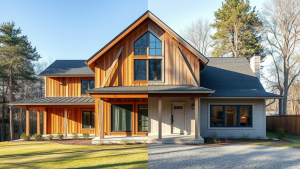A Rural Land Development Loan: The Complete Guide to Financing Your Country Dream Ever dreamed…
Building Your Dream Home: The Complete Guide to FHA Construction Loans
Building Your Dream Home: The Complete Guide to FHA Construction Loans

Understanding FHA Construction Loans

What Is an FHA Construction Loan?
Think of an FHA construction loan as a helping hand from the federal government to build your dream home. Unlike traditional construction loans, which typically require perfect credit and huge down payments, FHA construction loans are designed to make homebuilding accessible to more Americans.
Here’s what makes these loans special: the Federal Housing Administration (FHA) insures them, which means lenders are more willing to work with borrowers who might not qualify for conventional construction financing. It’s like having a trusted friend vouch for you at the bank.
But here’s the catch: While FHA loans are forgiving, they come with strict guidelines to protect both you and the lender. For example, your contractor must be FHA-approved, and your plans must meet specific safety and energy-efficiency standards.
Types of FHA Construction Loans
There are two main flavors of FHA construction loans:
Construction-to-Permanent Loans
This is your one-stop-shop option. You get a single loan that covers both construction and your permanent mortgage. The best part? You only go through one closing process and one set of fees. During construction, you typically only pay interest on the amount drawn, and once construction is complete, it automatically converts to a permanent mortgage.
Pro Tip: Ask your lender about “single-close” loans—these streamline the process even further by combining construction and permanent financing upfront.
203k Rehabilitation Loans
While not strictly for new construction, these loans help you purchase and renovate an existing home. They’re worth mentioning because sometimes building from scratch isn’t the best option for your situation.
- Limited 203k: For minor repairs (up to $35,000)
- Standard 203k: For major renovations (structural changes, room additions)
- Energy-Efficient Mortgages (EEMs) (The Hidden Gem)
This lesser-known FHA option lets you finance energy-efficient upgrades (solar panels, insulation, HVAC systems) into your loan. It’s perfect if you want to build a green home without upfront costs.
Benefits and Limitations
Benefits:
- Lower down payment requirements compared to conventional construction loans
- More flexible credit requirements
- Competitive interest rates thanks to government backing
- Single closing process for construction-to-permanent loans
- No income caps (unlike USDA loans)
Limitations:
- Must be your primary residence
- Requires mortgage insurance:
- Upfront MIP: 1.75% of the loan amount
- Annual MIP: 0.45–1.05% (varies by loan term and LTV)
- Property must meet FHA standards-(e.g., roof condition, foundation safety)
- Licensed contractors must perform the work, no DIY or self help.
Key Requirements and Qualifications

FICO Score Requirements
Let’s talk credit scores – and don’t worry, they’re more forgiving than you might think. The minimum FICO score for an FHA construction loan is 580, though some lenders might require 620 or higher. If your score is between 500-579, you might still qualify with a larger down payment, like 10%.
Pro Tip: If your credit score isn’t quite where you need it, take a few months to:
- Pay down credit card balances below 30% utilization
- Dispute errors on your credit report
- Avoid new credit inquiries
Down Payment Requirements
Here’s where FHA construction loans really shine. While conventional construction loans often require 20–25% down, FHA construction loans require as little as 3.5% with a credit score of 580 or higher. If your score is between 500–579, you’ll need 10% down.
But wait: Your down payment can come from gift funds (e.g., family members) or grants! Just document the source thoroughly.
Property and Construction Requirements
The FHA has specific requirements for the property and construction process:
- The property must be your primary residence
- The construction must meet FHA minimum property standards (e.g., safe drinking water, functional HVAC)
- You need detailed construction plans and specifications(architectural drawings required)
- The lot must be zoned residential
- All work must comply with local building codes
Contractor Requirements vs. DIY Considerations
I often get asked, “Can I do the work myself?” The short answer is: generally no. FHA construction loans require licensed and approved contractors to perform the work. This might seem limiting, but it’s actually protecting your investment.
Your contractor must:
- Be licensed and insured
- Have a proven track record
- Provide detailed cost estimates
- Meet FHA approval requirements (check the U.S. Department of Housing and Urban Development’s HUD contractor list).
The Application Process

Timeline Expectations
The big question everyone asks: “How long does it take?” Here’s a realistic timeline:
- Pre-approval: 1-2 weeks
- Contractor approval: 2-3 weeks
- Construction plans review: 2-4 weeks
- Final loan approval: 2-3 weeks
- Closing: 1-2 weeks
Total time from application to closing: typically 2-3 months
Required Documentation
Be prepared to provide:
- Income verification: W-2s, tax returns (2 years), pay stubs (30 days)
- Bank statements and asset documentation (3 months)
- Construction plans and specifications (signed by architect)
- Contractor information and bids (include licenses and insurance certificates)
- Land documentation (deed, survey, zoning approvals)
Permit Requirements
Yes, you need permits before closing – this is non-negotiable. Your contractor typically handles the permit process, but you should understand what’s needed:
- Building permits
- Zoning approvals
- Environmental assessments (if required)
- Utility permits
- Red Flag: If your contractor says, “We don’t need permits for this,” run. Unpermitted work can void your loan and create legal headaches.
Construction Plan Approval
Your construction plans need to be detailed and FHA-compliant. This includes:
- Architectural drawings (floor plans, elevations)
- Material specifications (e.g., roofing type, insulation R-value)
- Cost breakdowns (labor vs. materials)
- Construction timeline (with milestones)
Alternative Government-Backed Construction Loans
| Feature | FHA Construction | VA Construction | USDA Construction |
|---|---|---|---|
| Minimum Down Payment | 3.5% | 0% | 0% |
| Credit Score Minimum | 580 | 620 (typically) | 640 (typically) |
| Property Location | Anywhere | Anywhere | Rural areas only |
| Eligibility Requirements | Most buyers qualify | Veterans only | Income limits apply |
VA Construction Loans
For veterans, active service members, and eligible spouses, VA construction loans offer incredible benefits:
- No down payment required
- No private mortgage insurance
- Competitive interest rates
USDA Construction Loans
If you’re looking to build in a rural area, USDA construction loans offer:
- 100% financing possible
- Lower mortgage insurance rates
- Income must be below area median
Making Your Decision
Choosing Between Different Loan Types
Consider these factors when choosing your loan type:
- Your down payment availability: Can you afford 3.5%+?
- Credit score status: Are you above 580?
- Military service history: Are you eligible for VA benefits?
- Desired property location: Is it rural? Check USDA eligibility.
- Income level: USDA has strict income caps.
Case Study: A first-time buyer with a 600 credit score and 5% down chose FHA over conventional loans to avoid a 20% down payment. They closed in 11 weeks.
Tips for Success
- Start Early: Begin the process 6–12 months before breaking ground.
- Get Pre-approved: Know your budget before designing your home.
- Research Contractors: Get 3+ bids and check reviews on BBB or Google.
- Build in Contingencies: Add a 10–15% buffer to your budget for unexpected costs (e.g., material shortages).
Common Pitfalls to Avoid
- Underestimating total costs: Hidden fees like impact fees or soil testing can add thousands.
- Choosing an inexperienced contractor: Verify their FHA approval status.
- Rushing the planning phase: A poorly designed floor plan can’t be fixed later.
- Not getting everything in writing: Verbal promises won’t hold up in disputes.
Ready to Start Your Building Journey?
Building your own home might seem daunting, but with an FHA construction loan, it’s more achievable than you might think. Remember, the key to success is preparation and working with experienced professionals who can guide you through the process.
Next Steps:
- Check your credit score and begin improving it if needed
- Save for your down payment
- Research and interview contractors
- Contact us to discuss your options
Have questions about FHA construction loans or ready to start your application? Contact us today to connect with our experienced loan officers who specialize in construction financing.
Ready to make your move? Call North Bay Capital today. Let’s make that owner financing possible!
Ready to Turn Your Dream Home into Reality?
Whether you’re buying your first home, upgrading, or refinancing, we’re here to guide you every step of the way!
Call us today: 877-224-0333
Visit us online: www.northbaycap.com
Let’s make your homeownership journey smooth and stress-free!
North Bay Capital and Jesse Gonzalez NMLS 278103
Your Trusted Mortgage Experts








